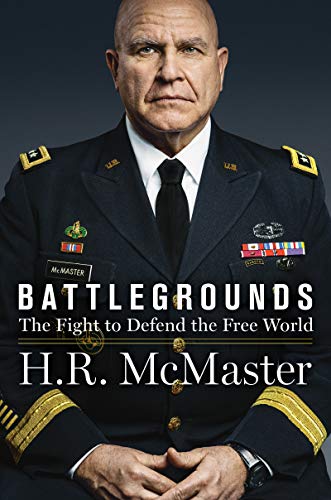
BATTLEGROUNDS
by H.R. McMaster
From Lt. General H.R. McMaster, U.S. Army, ret., the former National Security Advisor and author of the bestselling classic Dereliction of Duty, comes a bold and provocative re-examination of the most critical foreign policy and national security challenges that face the United States, and an urgent call to compete to preserve America’s standing and security.
Across multiple administrations since the end of the Cold War, American foreign policy has been misconceived, inconsistent, and poorly implemented. As a result, America and the free world have fallen behind rivals in power and influence. Meanwhile threats to security, freedom, and prosperity, such as nuclear proliferation and jihadist terrorism have grown. In BATTLEGROUNDS, H.R. McMaster describes efforts to reassess and fundamentally shift policies while he was National Security Advisor. And he provides a clear pathway forward to improve strategic competence and prevail in complex competitions against our adversaries.
BATTLEGROUNDS is a groundbreaking reassessment of America’s place in the world, drawing from McMaster’s long engagement with these issues, including 34 years of service in the U.S. Army with multiple tours of duty in battlegrounds overseas and his 13 months as National Security Advisor in the Trump White House. It is also a powerful call for Americans and citizens of the free world to transcend the vitriol of partisan political discourse, better educate themselves about the most significant challenges to national and international security and work together to secure peace and prosperity for future generations.
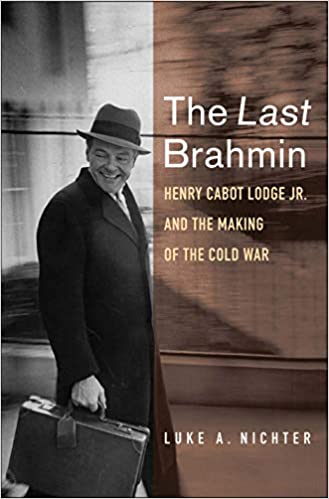
THE LAST BRAHMIN
by Luke A. Nichter
The first biography of a man who was at the center of American foreign policy for a generation
Few have ever enjoyed the degree of foreign-policy influence and versatility that Henry Cabot Lodge Jr. did—in the postwar era, perhaps only George Marshall, Henry Kissinger, and James Baker. Lodge, however, had the distinction of wielding that influence under presidents of both parties. For three decades, he was at the center of American foreign policy, serving as advisor to five presidents, from Dwight Eisenhower to Gerald Ford, and as ambassador to the United Nations, Vietnam, West Germany, and the Vatican.
Lodge’s political influence was immense. He was the first person, in 1943, to see Eisenhower as a potential president; he entered Eisenhower in the 1952 New Hampshire primary without the candidate’s knowledge, crafted his political positions, and managed his campaign. As UN ambassador in the 1950s, Lodge was effectively a second secretary of state. In the 1960s, he was called twice, by John F. Kennedy and by Lyndon Johnson, to serve in the toughest position in the State Department’s portfolio, as ambassador to Vietnam. In the 1970s, he paved the way for permanent American ties with the Holy See. Over his career, beginning with his arrival in the U.S. Senate at age thirty-four in 1937, when there were just seventeen Republican senators, he did more than anyone else to transform the Republican Party from a regional, isolationist party into the nation’s dominant force in foreign policy, a position it held from Eisenhower’s time until the twenty-first century.
In this book, historian Luke A. Nichter gives us a compelling narrative of Lodge’s extraordinary and consequential life. Lodge was among the last of the well‑heeled Eastern Establishment Republicans who put duty over partisanship and saw themselves as the hereditary captains of the American state. Unlike many who reach his position, Lodge took his secrets to the grave—including some that, revealed here for the first time, will force historians to rethink their understanding of America’s involvement in the Vietnam War.
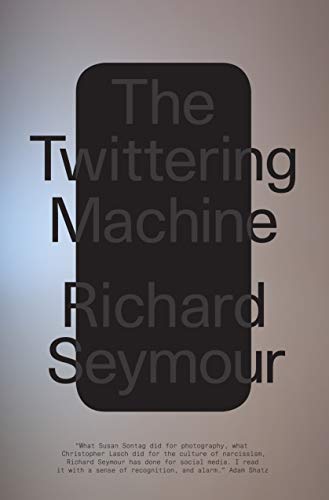
THE TWITTERING MACHINE
by Richard Seymour
A brilliant probe into the political and psychological effects of our changing relationship with social media
Former social media executives tell us that the system is an addiction-machine. We are users, waiting for our next hit as we like, comment and share. We write to the machine as individuals, but it responds by aggregating our fantasies, desires and frailties into data, and returning them to us as a commodity experience.
The Twittering Machine is an unflinching view into the calamities of digital life: the circus of online trolling, flourishing alt-right subcultures, pervasive corporate surveillance, and the virtual data mines of Facebook and Google where we spend considerable portions of our free time. In this polemical tour de force, Richard Seymour shows how the digital world is changing the ways we speak, write, and think.
Through journalism, psychoanalytic reflection and insights from users, developers, security experts and others, Seymour probes the human side of the machine, asking what we’re getting out of it, and what we’re getting into. Social media held out the promise that we could make our own history–to what extent did we choose the nightmare that it has become?
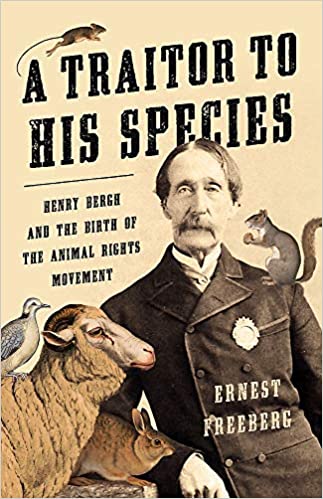
A TRAITOR TO HIS SPECIES
by Ernest Freeberg
From an award-winning historian, the outlandish story of the man who gave rights to animals.
In Gilded Age America, people and animals lived cheek-by-jowl in environments that were dirty and dangerous to man and beast alike. The industrial city brought suffering, but it also inspired a compassion for animals that fueled a controversial anti-cruelty movement. From the center of these debates, Henry Bergh launched a shocking campaign to grant rights to animals.
A Traitor to His Species is revelatory social history, awash with colorful characters. Cheered on by thousands of men and women who joined his cause, Bergh fought with robber barons, Five Points gangs, and legendary impresario P.T. Barnum, as they pushed for new laws to protect trolley horses, livestock, stray dogs, and other animals.
Raucous and entertaining, A Traitor to His Species tells the story of a remarkable man who gave voice to the voiceless and shaped our modern relationship with animals.
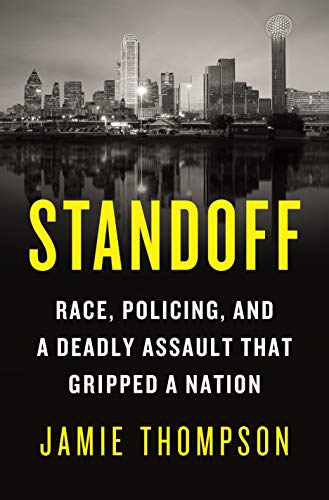
STANDOFF
by Jamie Thompson
Standoff is award-winning journalist Jamie Thompson’s gripping account of a deadly night in Dallas, told through the eyes of those at the center of the events, who offer a nuanced look at race and policing in America
On the evening of July 7, 2016, protesters gathered in cities across the nation after police shot two black men, Philando Castile and Alton Sterling. As officers patrolled a march in Dallas, a young man stepped out of an SUV wearing a bulletproof vest and carrying a high-powered rifle. He killed five officers and wounded eleven others.
It fell to a small group of cops to corner the shooter inside a community college, where a fierce gun battle was followed by a stalemate. Crisis negotiator Larry Gordon, a 21-year department veteran, spent hours bonding with the gunman―over childhood ghosts and death and shared experiences of racial injustice in America―while his colleagues devised an unprecedented plan to bring the night to its dramatic end.
Thompson’s minute-by-minute account includes intimate portrayals of the negotiator, a surgeon who operated on the fallen officers, a mother of four shot down in the street, and the SWAT officers tasked with stopping the gunman. This is a deeply affecting story of real people navigating a terrifying crisis and a city’s attempts to heal its divisions.
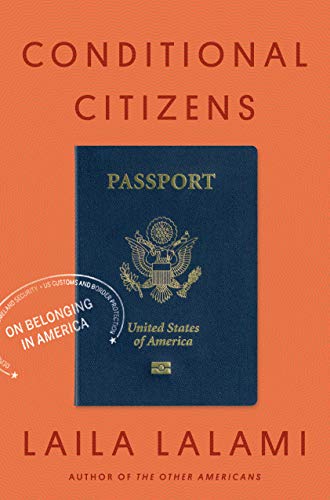
CONDITIONAL CITIZENS
by Laila Lalami
What does it mean to be American? In this starkly illuminating and impassioned book, Pulitzer Prize–finalist Laila Lalami recounts her unlikely journey from Moroccan immigrant to U.S. citizen, using it as a starting point for her exploration of the rights, liberties, and protections that are traditionally associated with American citizenship. Tapping into history, politics, and literature, she elucidates how accidents of birth—such as national origin, race, and gender—that once determined the boundaries of Americanness still their shadows today.
Lalami poignantly illustrates how white supremacy survives through adaptation and legislation, with the result that a caste system is maintained that keeps the modern equivalent of white male landowners at the top of the social hierarchy. Conditional citizens, she argues, are all the people with whom America embraces with one arm and pushes away with the other.
Brilliantly argued and deeply personal, Conditional Citizens weaves together Lalami’s own experiences with explorations of the place of nonwhites in the broader American culture.

THOSE WHO FORGET
by Geraldine Schwarz
Those Who Forget, published to international awards and acclaim, is journalist Géraldine Schwarz’s riveting account of her German and French grandparents’ lives during World War II, an in-depth history of Europe’s post-war reckoning with fascism, and an urgent appeal to remember as a defense against today’s rise of far-right nationalism.
During World War II, Géraldine Schwarz’s German grandparents were neither heroes nor villains; they were merely Mitlaüfer—those who followed the current. Once the war ended, they wanted to bury the past under the wreckage of the Third Reich.
Decades later, while delving through filing cabinets in the basement of their apartment building in Mannheim, Schwarz discovers that in 1938, her paternal grandfather Karl took advantage of Nazi policies to buy a business from a Jewish family for a low price. She finds letters from the only survivor of this family (all the others perished in Auschwitz), demanding reparations. But Karl Schwarz refused to acknowledge his responsibility. Géraldine starts to question the past: How guilty were her grandparents? What makes us complicit? On her mother’s side, she investigates the role of her French grandfather, a policeman in Vichy.
Weaving together the threads of three generations of her family story with Europe’s process of post-war reckoning, Schwarz explores how millions were seduced by ideology, overcome by a fog of denial after the war, and, in Germany at least, eventually managed to transform collective guilt into democratic responsibility. She asks: How can nations learn from history? And she observes that countries that avoid confronting the past are especially vulnerable to extremism. Searing and unforgettable, Those Who Forget is a riveting memoir, an illuminating history, and an urgent call for remembering.

ALL WE CAN SAVE
Edited by Ayana Elizabeth Johnson & Katharine K. Wilkinson
Provocative and illuminating essays from women at the forefront of the climate movement who are harnessing truth, courage, and solutions to lead humanity forward.
There is a renaissance blooming in the climate movement: leadership that is more characteristically feminine and more faithfully feminist, rooted in compassion, connection, creativity, and collaboration. While it’s clear that women and girls are vital voices and agents of change for this planet, they are too often missing from the proverbial table. More than a problem of bias, it’s a dynamic that sets us up for failure. To change everything, we need everyone.
All We Can Save illuminates the expertise and insights of dozens of diverse women leading on climate in the United States—scientists, journalists, farmers, lawyers, teachers, activists, innovators, wonks, and designers, across generations, geographies, and race—and aims to advance a more representative, nuanced, and solution-oriented public conversation on the climate crisis. These women offer a spectrum of ideas and insights for how we can rapidly, radically reshape society.
Intermixing essays with poetry and art, this book is both a balm and a guide for knowing and holding what has been done to the world, while bolstering our resolve never to give up on one another or our collective future. We must summon truth, courage, and solutions to turn away from the brink and toward life-giving possibility. Curated by two climate leaders, the book is a collection and celebration of visionaries who are leading us on a path toward all we can save.
With essays and poems by:
Emily Atkin • Xiye Bastida • Ellen Bass • Colette Pichon Battle • Jainey K. Bavishi • Janine Benyus • adrienne maree brown • Régine Clément • Abigail Dillen • Camille T. Dungy • Rhiana Gunn-Wright • Joy Harjo • Katharine Hayhoe • Mary Annaïse Heglar • Jane Hirshfield • Mary Anne Hitt • Ailish Hopper • Tara Houska, Zhaabowekwe • Emily N. Johnston • Joan Naviyuk Kane • Naomi Klein • Kate Knuth • Ada Limón • Louise Maher-Johnson • Kate Marvel • Gina McCarthy • Anne Haven McDonnell • Sarah Miller • Sherri Mitchell, Weh’na Ha’mu Kwasset • Susanne C. Moser • Lynna Odel • Sharon Olds • Mary Oliver • Kate Orff • Jacqui Patterson • Leah Penniman • Catherine Pierce • Marge Piercy • Kendra Pierre-Louis • Varshini • Prakash • Janisse Ray • Christine E. Nieves Rodriguez • Favianna Rodriguez • Cameron Russell • Ash Sanders • Judith D. Schwartz • Patricia Smith • Emily Stengel • Sarah Stillman • Leah Cardamore Stokes • Amanda Sturgeon • Maggie Thomas • Heather McTeer Toney • Alexandria Villaseñor • Alice Walker • Amy Westervelt • Jane Zelikova
